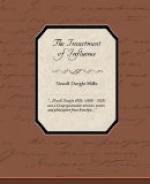Impotent the intellect without the support of the heart. How thickly are the shores of time strewn with those forms of wreckage called great thoughts. In those far-off days when the overseers of the Egyptian King scourged 80,000 slaves forth to their task of building a pyramid, a great mind discovered the use of steam. Intellect achieved an instrument for lifting blocks of granite into proper place. In that hour thought made possible the freedom of innumerable slaves. But the heart of the tyrant held no love for his bondsmen. The poor seemed of less worth than cattle. Because the King’s heart felt no woes to be cured, his hand pushed away the engine. A great thought was there, but not the kindly impulse to use it. Then, full 2,000 years passed over our earth. At last came an era when man’s heart journeyed forward with his mind. Then the woes of miners and the world’s burden-bearers filled the ears of James Watt with torment, and his sympathetic heart would not let him stay until he had fashioned his redemptive tool.
For generations, also, the thoughts of liberty waited for the heart to re-enforce them and make them practical in institutions. Two thousand years before the era of Cromwell and Hampden, Grecian philosophers wrought out a full statement for the republic and individual liberty. The right of life and liberty and the pursuit of happiness were truths clearly perceived by Plato and Pericles. But the heart loved luxury and soft, silken refinements, and Grecian philosophers in their palaces refused to let their slaves go.
Wide, indeed, the gulf separating our age of kindness from Cicero’s age of cruelty! The difference is almost wholly a difference of heart. This age has oratory and wisdom, and so had Cicero’s; this age has poetry and art, and so had that; but our age has heart and sympathy, and Cicero’s had not. Caesar’s mind was the mind of a scholar, but his hands were red with the blood of a half-million men slain in unjust wars. Augustus loved refinement, literature and music. He assembled at his table the scholars of a nation, yet his culture did not forbid the slaying of ten thousand gladiators at his various garden parties.
We admire Pliny’s literary style. One evening Pliny returned home from the funeral of the wife of a friend and sat down to write that friend a note of gratitude for having so arranged the gladiatorial spectacle as to make the funeral service pass off quite pleasantly. For that age of intellect was also an age of blood; the era of art and luxury was also an era of cruelty and crime. The intellect lent a shining luster to the era of Augustus, but because it was intellect only it was gilt and not gold. Had the heart re-enforced the intellect with sympathy and justice the age of Augustus might have been an era golden, indeed, and also perpetual.




